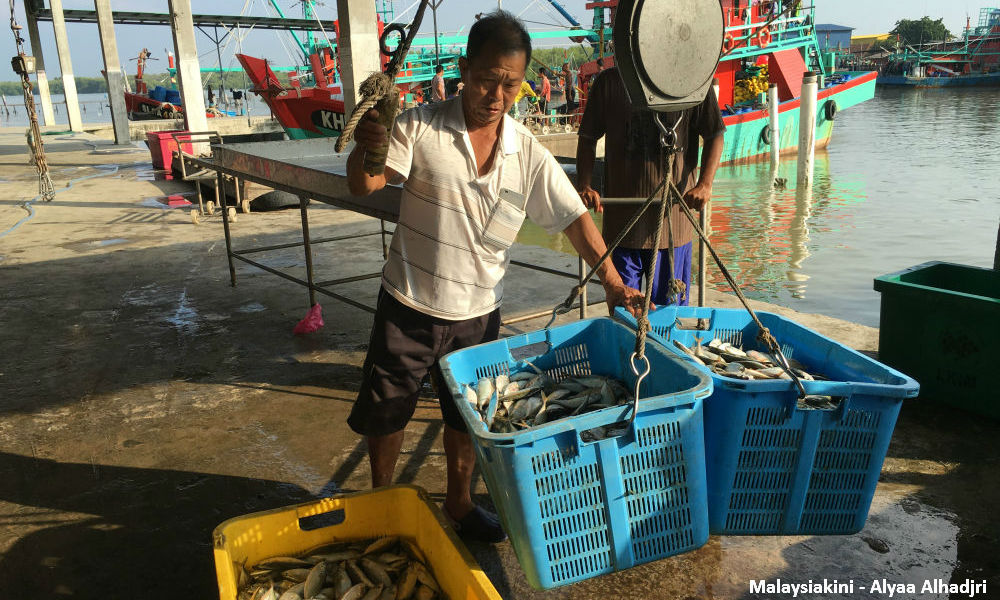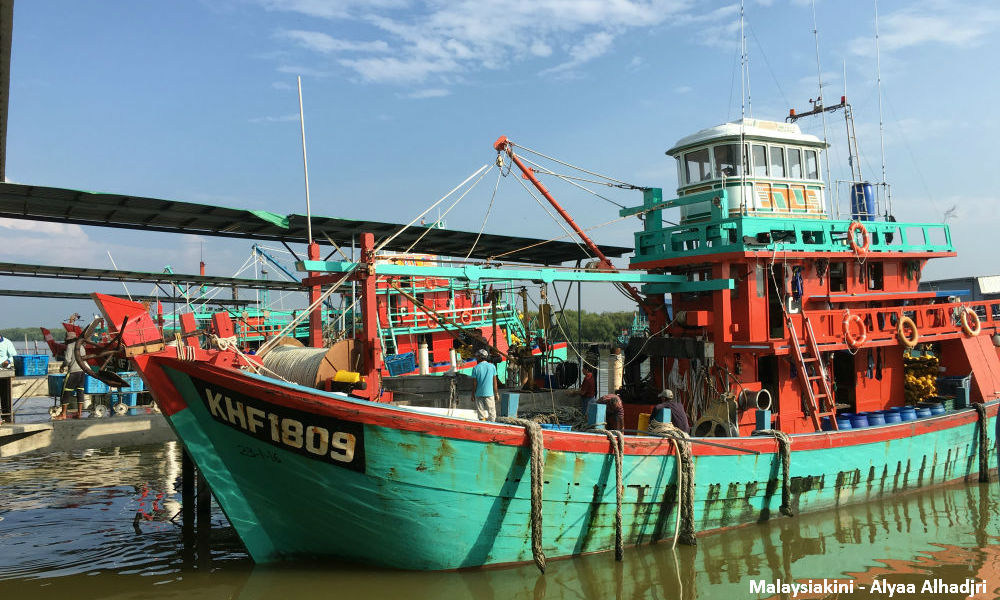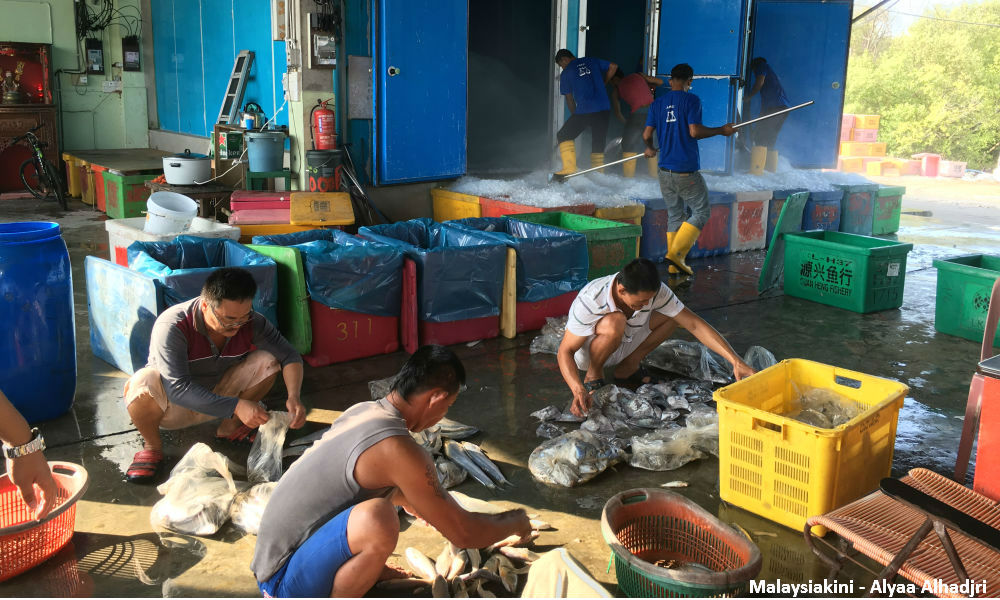SG BESAR POLLS In the first week of campaigning in Sungai Besar, all three parties have been actively trying to 'net' support from areas identified as Bagan (wharf) or local fishing villages.
A major grouse is the lack of income stability due to circumstances that are as unpredictable as the ocean waves.
On one hand, they fear that going out too far could see them being netted by Indonesian marine authorities.
 But on the other hand, remaining too close to shore is also a problem, as the larger vessels with trawler nets could destroy the seabed.
But on the other hand, remaining too close to shore is also a problem, as the larger vessels with trawler nets could destroy the seabed.
Tan Chai Heng (photo) is the owner of one of the three boats detained near Batam, Indonesia, on March 3.
"They said our boats can get out (released) but now they said no," said Tan when met at the MCA Sekinchan office.
His captain and crews are still under detention, despite efforts to secure their release.
The boat itself is a deep sea trawler that typically goes out between 5 to 12 nautical miles or 12 to 30 nautical miles from shore - depending on its license - Class B or Class C.
Class A license is reserved for coastal fishermen using traditional fishing boats and nets.
Tan said to replace the lost boat now would cost him up to RM1 million.
He also used to be a fisherman and is no stranger to such encounters while out at sea.
 "I saw them (Indonesian maritime patrol) a few times. I had to cut my trawler net and lost the catch.
"I saw them (Indonesian maritime patrol) a few times. I had to cut my trawler net and lost the catch.
"If they see our boats, they can come to cut our nets and drag us to Indonesian waters," he said.
"There were even cases where our fishermen were shot," he claimed, though admitting it has been at least 10 years since such an incident occurred.
Indonesia under Maritime and Fisheries Minister Susi Pudjiastuti has declared war against foreign vessels that allegedly encroach into its waters.
"Our own maritime must be more alert. Otherwise, we will see one boat (from Indonesia) coming at 50 knots per hour while ours is only 8 knots," said Tan, who claimed that the Indonesian patrols were not afraid of Malaysia's own maritime force.
 While Indonesian authorities insisted that the arrests were done within their territories, Tan was similarly adamant that his boat's GPS showed the coordinates as still being in Malaysian waters.
While Indonesian authorities insisted that the arrests were done within their territories, Tan was similarly adamant that his boat's GPS showed the coordinates as still being in Malaysian waters.
"We got lights. We got GPS. These boats come at us (Malaysian boats), cut our nets and drag us to Indonesian waters," he claimed.
He further alleged that such cases in the past could be 'settled' by paying the Indonesian authorities between RM100,000 to RM300,000.
Just this year, Tan estimated that 16 Malaysian vessels are currently detained by Indonesia.
"I think they already 'bombed' the ships," he said referring to Indonesia's policy to sink detained ships.
Indonesian officials had in April reportedly destroyed 10 Malaysian fishing boats as part of the country’s efforts to tackle poaching.
The boats were reportedly destroyed across seven locations including Sumatra, Batam and Aceh.
'Cannot kao tim anymore'
Chia Teck Lee, 50, said his own friend was also arrested in February near Medan, Sumatera, and now serving a 31-month jail sentence.
"We tried to 'kao tim' (bribe) them but now we cannot anymore.
 "With the old minister, we could make a deal. Now with Susi it is very difficult," said Chia (photo) who worked at one of the jetties in Sekinchan.
"With the old minister, we could make a deal. Now with Susi it is very difficult," said Chia (photo) who worked at one of the jetties in Sekinchan.
Chia claimed that the negotiation attempts went on for two months but to no avail.
Like Tan, he also claimed that such negotiations in the past could involve payments of a few hundred thousand ringgit.
"Now we don't want to hear any more promises.
"We were told by (Umno Sungai Besar chief) Jamal (Yunos) that they would all be released by polling day," said Chia who brought along his friend's youngest son.
Asked on calls for the government to review subsidies and allowances for deep sea fishermen, Tan insisted that they were not as rich as people made them out to be.
"Bukan ini macam. Mau cari makan kita kena pergi hantam kuat-kuat. Satu hari 15 jam. (Not like this. If we want to earn a living, we have to work really hard. Fifteen hours a day)
"If I give you a boat but you only sit at home, how are you to earn money?" he said, adding that a good catch could earn him about RM30,000.
 Compared to their coastal counterparts, deep sea fishermen can go out for over a week.
Compared to their coastal counterparts, deep sea fishermen can go out for over a week.
Bagan Sungai Besar is just one of several major entry and exit points for deep sea trawlers around Sekinchan and Sungai Besar.
Upon arrival, crews and dock hands would immediately unload the boats; sort and weigh the catch; pack it in ice-filled plastic crates; and load the crates onto waiting lorries - ready to be transported.
Several 'towkays' could be seen observing the whole process while one lady sat in a corner, recording the figures and amount to be paid in a ledger.
Their catch, amounting to several tonnes, would be sold at local markets, exported or processed into low-cost feed for aquaculture farms.
Asked what would be his main request to the government, Tan said it would be to allow Class B vessels to employ foreign workers as its crews.
This is aside from greater security while out at sea.
Both requests have been fulfilled
Home Minister Ahmad Zahid Hamidi at a function in Sungai Besar yesterday confirmed that the government has fulfilled their requests and fishermen with Class B vessels can now submit applications to hire foreign crew members.
He even cited the ancient Chinese practice of conducting a “chicken sacrifice” pledge to convince them of the government's commitment, in exchange for votes.
Zahid also reassured that the government through Wisma Putra will be offering legal assistance to all Malaysian fishermen detained in Indonesia.
After all the efforts, come polling day on June 18, it will be seen which party can 'net' the most amount of support from the local fishermen.

